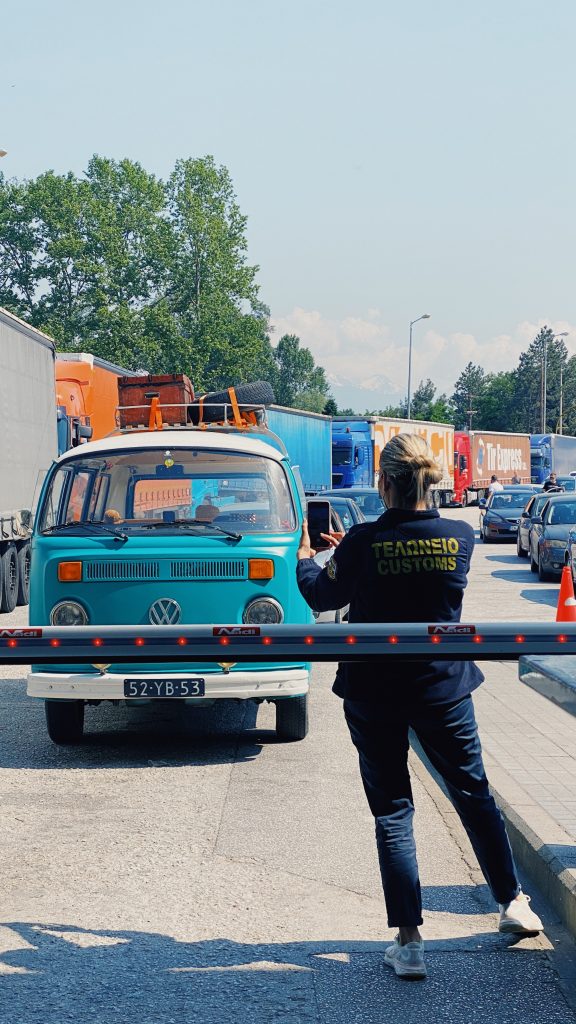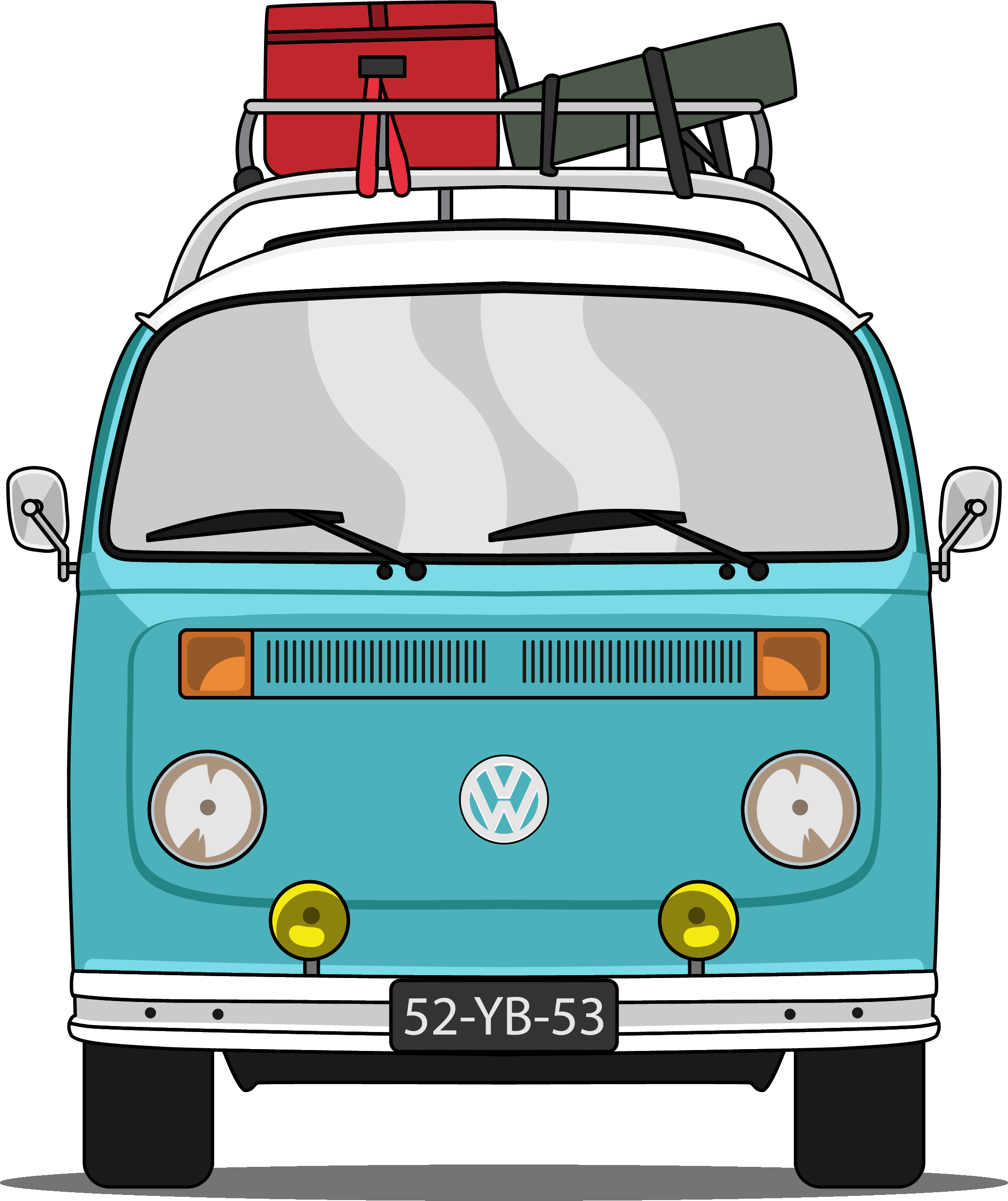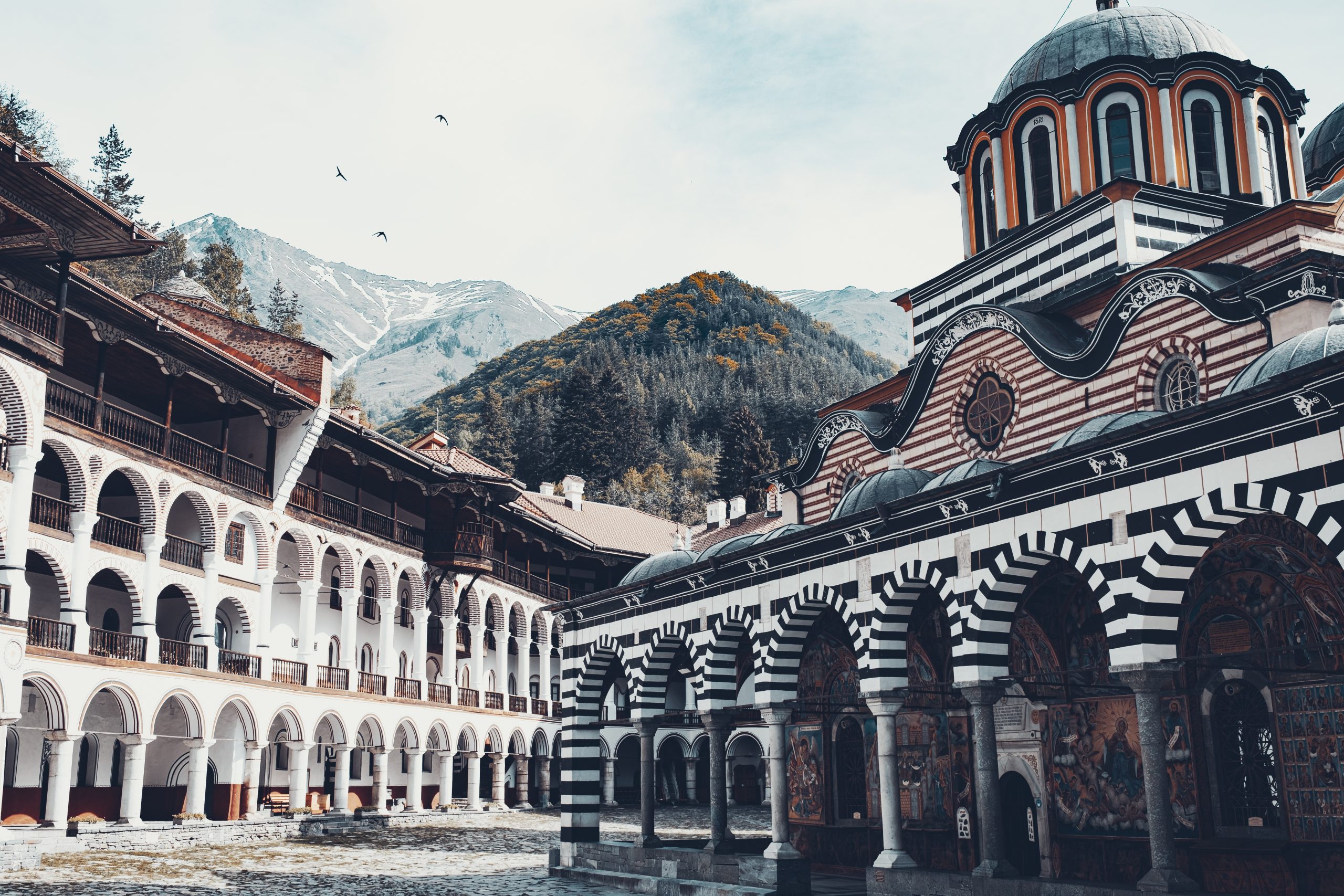For the first time in our lives we experienced the feeling of being rejected when wanting to cross a border. Alright, Bosnia and Herzegovina already denied our entry but we were alright with that. Now Greece denied us entry. While Bosnia and Herzegovina is not part of the EU, thus no shengen-country, Greece is. I think it’s good to let us sweat a little bit at the border. We are too spoiled and used to our privilege of carrying a Dutch passport that we need to be stopped once in a while.
Back in Macedonia
After a lovely stay at the Blue Eye we tried to cross the border from another point of Albania. The Albanian border officers were very kind and were keen on letting us through. But to be sure we would get through they told us to walk to the Greek border and talk to the officers there. Well, they were quite clear: no Dutch people are allowed to enter Greece. “Go to Bulgaria” he unkindly said. “Go to Bulgaria? But that’s like two days driving and crossing two borders!” “Your problem.” Alright he didn’t say that with words but his face showed us. We even showed him a photo of our beautiful van in the hope he would realise that it will take us a couple of days because the quickest we go – on a highway – is 80 km’s an hour. But he didn’t give in. And so, we left…
The road to Macedonia is one we had already taken when we left Ohrid about a week ago. Driving the same road back is normally not a feast, but in Albania it is. You get to see the mountains from another side and that’s lovely. Nonetheless, after three hours of winding roads through the mountains and dodging potholes I grew a bit tired of the driving. After 6.5 hours we crossed the border from Albania into Macedonia without much fuzz and ended up at a nice and quiet parking lot at lake Prespa.
The next day we took the fast road to Bulgaria and it was quite boring actually. Except for the last kilometers, those were magnificent. Very green and hilly.
A new unexpected country
The crossing into Bulgaria wasn’t that easy. Getting out of Macedonia was easy, they didn’t really care about where we come from, nor where we are going. However, getting into Bulgaria was a tad difficult. Of course they asked for a PCR test, which we don’t have. So, what to do now? There were many people at the border and only one car; us. You can imagine they had lots of time to discuss what to do with us and to ask us all sorts of questions. In the end they agreed upon 12 hours entry. “But it is late now and we are not fast, we can never reach Turkey”. “Ok, 24 hours then. You can sleep somewhere and go to the nearest border tomorrow”. Agreed!
What to do in Bulgaria when you have 24 hours?
We decided to go to the Jerusalem of Bulgaria: Rila Monastery. Well, we would first go to a campsite close by and tomorrow morning it would be the first thing we would do. The campsite was very cute, yeah I’m sure nothing changed since the Sovjet times but it was surrounded by nature, owned by a man nor dead nor alive and had a warm shower. I didn’t shower for a week so this was very welcome! We roasted some sausages, had a nice hike and went to bed.
Rila Monastery
Another UNESCO heritage site on our list! But what is it? Let me explain briefly:
Rila Monastery was founded in the 10th century by St John of Rila, a hermit canonized by the Orthodox Church. His ascetic dwelling and tomb became a holy site and were transformed into a monastic complex which played an important role in the spiritual and social life of medieval Bulgaria. Rila Monastery was founded in honor of the ascetic St. Ivan of Rila (also know as St John of Rila) in the 10th century. He spent the last 20 years of his life praying in relative solitude at a cave some four kilometers away. St. Ivan was revered as a saint during his lifetime. Believers flocked to the remote cave to receive his blessing. The monastery was destroyed by fire at the beginning of the 19th century and the complex was rebuilt between 1834 and 1862. A characteristic example of the Bulgarian Renaissance (18th–19th centuries), the monument symbolizes the awareness of a Slavic cultural identity following centuries of occupation.
Normally lots of tourists flock to the site we had the place to ourselves. That truly adds to the experience of the monastery. Even though we are not religious, these religious monuments have some sort of impact. Not sure why but they always make you whisper, be quiet with your thoughts and be in awe with the grandeur of these religious buildings. Like I wrote before it also makes me question the idea of religion to be honest. This hermit St John of Rila lived his life in solitude in a cave, so I wonder, if he lived his life like that why would we have to built a monastery filled with gold and paintings selling postcards and other knick knacks. Would he be happy that all this was built in his name? Whereas he chose to be living his life in a cave. And what about all the gold? The more you have the better God listens to you? Or is it just about showing off to people who can barely afford to buy themselves some bread?
But we have to be honest, the monastery IS amazing, truly. It’s magnificent, the woodwork, the murals, the nature surrounding it.
Back to our travels. We visited the monastery and were all alone, which was great! After a coffee we moved towards the border.
Third time’s a charm
Or not. A busy border but the one of the two borders that is actually open to tourists, so we didn’t have much choice. The Bulgarian man was very kind but we soon found out they had almost no authority here. The border is ruled by the Greeks and their regulations are the most important ones. We did not do a PCR test, to be honest I think PCR tests are rubbish and I truly hope this will soon end because it doesn’t make much sense to me. Of course we understand the impact of the virus and the serious situation, but this PCR test feels like another way to earn money quickly. Different rules apply to different nationalities. If you’re Greek you can go in quarantaine, if you’re Bulgarian you can do an antigen test and if you’re a tourists you have to do a PCR test AND do an antigen test at the border.
The Greeks were clear; we wouldn’t get through without a PCR test. What to do? We do a PCR test.
The spiritual powers of Petrich
Luckily for us about 20 minutes from the border is the Rockefeller Hospital of Petrich where they were so kind to help us out and do a PCR test even though we were late. The same evening we would get the results. In the meantime we explored the town of Petrich. Not a very big town but nice. We checked out the market and some shops. What we did not know is that Petrich is not just a village but a village with apparently spiritual powers. Close to Petrich one can find the mineral water and thermal baths of the Roupite Springs, which of course have medicinal powers. Also close to Petrich are remains from the ancient fortress of Istra and Baba Vanga resided her until her death.
Baba Vanga was a Bulgarian mystic, clairvoyant, and herbalist. She was blind since early childhood and possessed paranormal abilities. Some sources claim that she foretold the break-up of the Soviet Union, the Chernobyl disaster, the date of Stalin’s death, the sinking of the Russian submarine Kursk, the September 11 attacks, Topalov’s victory in the world chess tournament and the tensions with North Korea. Some say it’s all false and none of it is true. What do you think?
After a delicious Bulgarian lunch we headed back to the hospital where we received the result. A big NEGATIVE. We weren’t really surprised, didn’t feel ill or experience any of the symptoms.
Instead of crossing the border we decided to visit the springs and home of Baba Vanga. Next to the springs is a big field full of flowers, and soon we found out; a heaven for mosquito’s, where we parked the van for the night. We were surrounded by a couple other vans and campers of which one was from Ireland. After having a nice bath in the HOT spring (some were just too hot for anyone who wouldn’t want to end up with burn wounds), we chatted with the Irish until midnight.

Not 24 but 48 hours
We overstayed in Bulgaria, but it didn’t matter. At the border they barely looked at our passports. The Greeks did though: PLF, PCR, passport, car insurance, registration certificate. They asked for it all and had to go through it all. And then I had to do another antigen test, which didn’t make sense to me at all, but I did spend some time in these thermal baths with other people. Although I’m sure nothing would survive for too long in those hot springs, it might also give me some spiritual powers from Baba Vanga. Who knows. But no, again NEGATIVE and that means: Γεια σου Ελλάδα or: Hello Greece!
Love, Milene & Yuri










